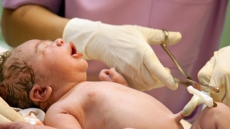TORONTO — A new study suggests about 15 per cent of children who have a severe allergic reaction that involves anaphylaxis can actually have a second reaction hours after the first.
It warns that doctors and parents should be on the lookout for this type of two-stage or biphasic anaphylactic reaction.
Some predictors of who might develop biphasic anaphylaxis include children aged six to nine, children who needed more than one dose of epinephrine to control their reaction and children who were delayed in getting treatment initially.
Adults can also have biphasic anaphylactic reactions but this study looked only at children with the condition.
The study is the largest ever to look at biphasic anaphylaxis; it is published in the journal Annals of Allergy, Asthma and Immunology.
Led by researchers from the Children's Hospital of Eastern Ontario, it looked at the records of 484 children who were treated for anaphylaxis at CHEO or at the Hospital for Sick Children in Toronto.
The goal was to try to figure out how common biphasic reactions were and if there were ways to predict which children were at the highest risk of having a second delayed reaction.
"The key message is ... treat an allergic reaction with epinephrine and treat it early," says Dr. Waleed Alqurashi, the first author of the paper.
"And after that, seek help. That's the key message for parents."
Anaphylaxis is an acute allergic reaction, often associated with consumption of trigger foods — such as peanuts or shellfish — or by things like bee stings. People who have allergies that can induce anaphylaxis are supposed to carry Epi-Pens — epinephrine — to counteract the reaction.
Anaphylaxis can lead to shock and closing of the airways and can be fatal.
Of the cases Alqurashi and his co-authors studied, 71 or 15 per cent had a second delayed reaction. Three-quarters of the delayed reactions occurred within six hours of the original reaction.
Alqurashi said children who had an initial severe reaction should remain in the emergency department under observation for some hours to ensure early treatment if they have a delayed second reaction.
Conversely kids who had mild reactions and were treated early can probably go home sooner, he said.
Alqurashi suggested doctors use the prediction factors in the study with caution, noting the findings need to be validated with another study. He and his colleagues are currently working on one that records and follows cases prospectively — as they arrive for care — rather than retrospectively from files. Prospective studies are considered a stronger form of evidence.
"As with anything in medicine, you cannot adopt practice based on one single piece of evidence.... Especially for prediction rules — they have to be really robustly validated," he said.






